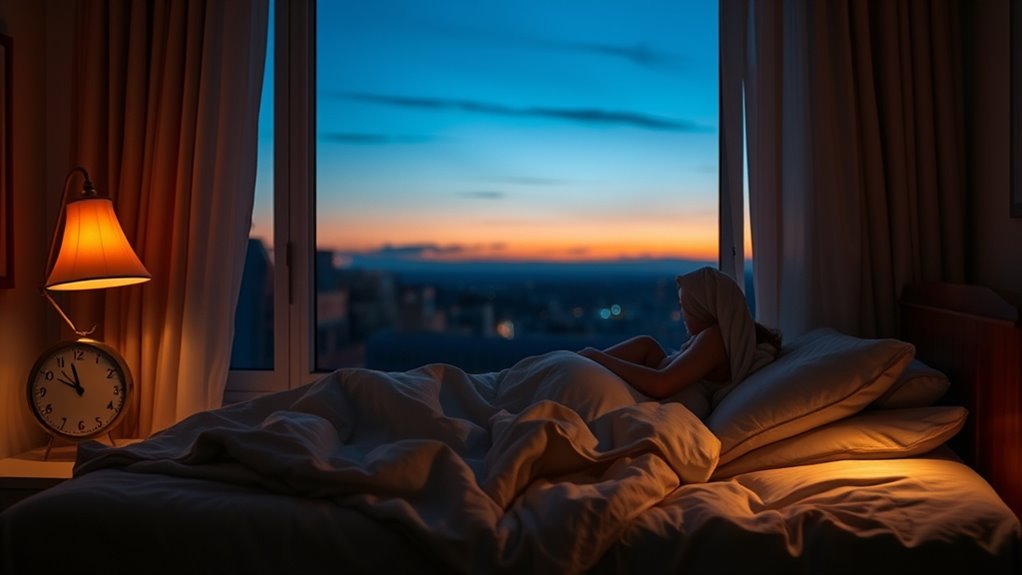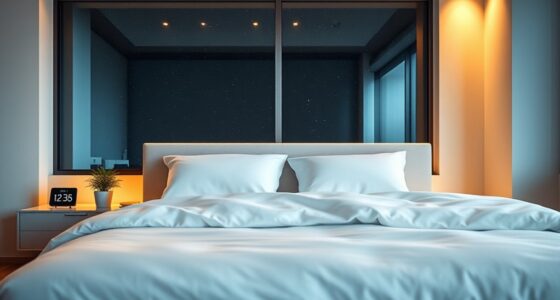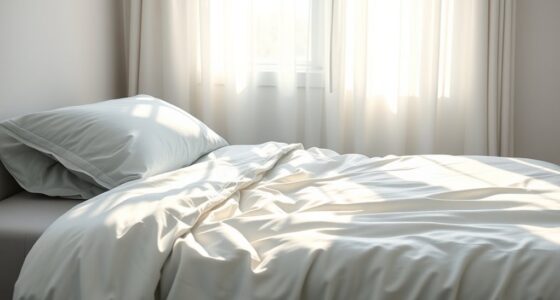Your chronotype reflects your natural sleep and activity preferences, making you a morning person or a night owl. It’s influenced by your biological clock, which is regulated by light signals in your brain. If you’re a night owl, you tend to stay awake later and feel more alert at night. Understanding your chronotype can help you optimize your schedule and boost your energy—if you want to uncover how, keep exploring these fascinating insights.
Key Takeaways
- Chronotypes reflect individual preferences for sleep and activity times, ranging from morning larks to night owls.
- Night owls have later biological clocks, making them naturally alert in the evening and prefer late sleep schedules.
- Light exposure influences your circadian rhythm; evening light can reinforce a night owl tendency.
- Your chronotype is shaped by biology but can be slightly adjusted through lifestyle and light management.
- Identifying if you’re a night owl helps optimize routines and improve sleep quality by aligning with your natural rhythms.

Have you ever wondered why you’re naturally more alert in the morning while someone else feels their best at night? The answer lies in your sleep patterns and your biological clocks. These internal systems determine when you feel most awake or sleepy, shaping your daily rhythms and influencing how you function throughout the day. Everyone has a unique chronotype, which is essentially your body’s natural preference for sleep and activity times. Some people are morning larks, waking up energized and ready to seize the day, while others are night owls, hitting their peak performance late at night. Recognizing your chronotype helps you understand why you might struggle with early mornings or why late nights come more naturally to you.
Your biological clock, primarily governed by a group of cells in your brain called the suprachiasmatic nucleus, keeps your sleep patterns aligned with the 24-hour day-night cycle. Light exposure plays a crucial role in regulating this clock. When you wake up and see sunlight, it signals your brain that it’s time to be alert, suppressing sleep hormones like melatonin. Conversely, as it gets darker, melatonin production ramps up, making you feel sleepy. This finely tuned system influences your overall sleep patterns, dictating when you feel tired or energized. If your biological clock runs slightly later, you might find yourself staying awake longer and feeling more alert at night, earning the label of a night owl. If it runs earlier, mornings become your prime time, and evenings might feel sluggish. Recent AI discoveries demonstrate how technology could someday help tailor sleep schedules based on your individual biological rhythms.
Understanding your chronotype can help you optimize your daily routine. For instance, if you’re a night owl, forcing yourself into an early schedule may lead to sleep deprivation and decreased productivity. Conversely, morning people might struggle to stay alert late into the night. It’s not just about habits but about aligning your activities with your biological predispositions. Knowing your sleep patterns enables you to plan tasks when you’re naturally most alert, improving focus and efficiency.
Frequently Asked Questions
Can Chronotypes Change Over a Lifetime?
Your chronotype can change over your lifetime as your circadian rhythm shifts due to age, lifestyle, and environmental factors. You might start as a night owl and become more of a morning person, or vice versa. These changes influence your sleep patterns and alertness times. While some aspects are natural, maintaining a consistent sleep schedule can help regulate your circadian rhythm and support your evolving chronotype.
How Do I Determine My Exact Chronotype?
Imagine a giant clock inside your mind, ticking with your sleep patterns and morning preferences. To find your exact chronotype, track your natural sleep and wake times for a week without alarms. Notice when you feel most alert or sleepy. Do mornings energize you or leave you dragging? This self-observation reveals if you’re a morning lark, night owl, or somewhere in between, helping you optimize your daily routine.
Are Chronotypes Linked to Mental Health?
Your sleep patterns and circadian rhythms influence your mental health considerably. When your chronotype aligns with your natural rhythms, you’re likely to experience better mood, focus, and resilience. Disruptions to these patterns, like staying up late or irregular sleep, can increase stress and anxiety. So, understanding your chronotype helps you optimize your sleep schedule, supporting mental well-being and preventing potential issues linked to circadian rhythm misalignment.
Can Adjusting My Schedule Improve My Chronotype?
Adjusting your schedule can help improve your sleep habits and reduce social jetlag, which may positively influence your chronotype. By gradually shifting your sleep and wake times to align better with natural rhythms, you may find it easier to wake up refreshed and stay alert. Consistency is key, so make small changes and stick with them to help your body adapt, ultimately enhancing your overall well-being and sleep quality.
Do Chronotypes Affect Athletic Performance?
Your sleep preferences, shaped by your circadian rhythms, can influence athletic performance. If you’re a night owl, you might find that your peak alertness and energy levels occur later in the day, potentially benefiting evening workouts. Conversely, early risers may excel in morning activities. Understanding your chronotype helps optimize training times, ensuring you perform at your best when your circadian rhythms align with your athletic goals.
Conclusion
Understanding your chronotype is like finding your personal rhythm in a busy symphony. When you recognize whether you’re naturally a night owl or a morning lark, you can tune your schedule to harmonize with your body’s tempo. Embracing this knowledge helps you work smarter, sleep better, and feel more energized. So, listen to your internal clock—it’s the compass guiding you through life’s daily dance, ensuring you’re always in step with your true self.









